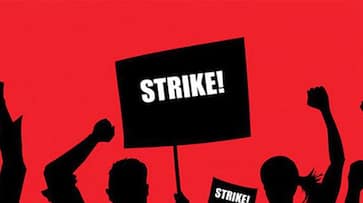The state government on Monday night directed all employees to report for duty on Tuesday and warned of strict disciplinary action against those who failed to comply under MESMA (Maharashtra Essential Services Maintenance Act) and salary cuts
In the series of demonstration that has been rocking the nation in the recent past, the latest episode involves around 17 lakh employees of the Maharashtra government going on strike on Tuesday to press for various demand, including the implementation of the Seventh Pay Commission.
The state government on Monday night directed all employees to report for duty on Tuesday and warned of strict disciplinary action against those who failed to comply under MESMA (Maharashtra Essential Services Maintenance Act) and salary cuts.
It also announced payment of pending Dearness Allowance (DA) for 14 months to 150,000 gazetted officers, who accordingly withdrew from the three-day agitation.
An official of the Maharashtra State Employees Organisation (MSEO) said that all employees right upto taluka levels have joined the agitation.
The MSEO has accused the state government of sitting on its demands including the implementation of the Seventh Pay Commission Report, effective from January 1, 2016.
However, later it dilly-dallied saying that it was awaiting the report of the K.P. Bakshi Committtee in the matter as implementing the Commission would entail an additional burden of a staggering Rs 21,000-crore on the debt-hit state.
Other major demands include implementation of a five-day week in all government offices, increasing the retirement age from 58 to 60 and filling up urgently over 200,000 vacancies in the state.
The MSEO, Maharashtra State Class IV Employees Association and other affiliated associations served a notice to strike to the General Administration Department on July 16, but there was no response.
The unions have said that they will not settle for "mere assurances" but only direct action from the government, since the strike was deferred several times in the past few years on such promises.
Tuesday's action has hit normal work in all government offices including the headquarters, Mantralaya in Mumbai, collectorates, tehsils and talukas, besides educational, medical and other government institutions.
However, this is not the first time that the nation has been crippled by such strikes.
Nagpur witnessed a flash strike on August 4, following which the Nagpur Municipal Corporation’s (NMC) city bus service was crippled. Things regained normalcy only on August 5.
In Bengaluru, staff of Kempegowda Institute of Medical Sciences (KIMS) started a relay hunger strike on Wednesday to demand scrapping of the additional appointment of nearly 700 non-teaching staff.
The Gujarat state branch of Indian Medical Association (IMA) also went for a strike on July 28 to extend its support to a nation-wide strike against the National Medical Commission (NMC) Bill 2017.
Private and government hospitals in Kolkata also supported the cause and went for a strike, which affected services at the outpatient departments.
Maharashtra, Rajasthan, Madhya Pradesh and Punjab recently witnessed a farmer strike, which severely affected the supply of vegetable and milk.
Last Updated Aug 7, 2018, 2:33 PM IST









![Salman Khan sets stage on fire for Anant Ambani, Radhika Merchant pre-wedding festivities [WATCH] ATG](https://static-gi.asianetnews.com/images/01hr1hh8y86gvb4kbqgnyhc0w0/whatsapp-image-2024-03-03-at-12-24-37-pm_100x60xt.jpg)
![Pregnant Deepika Padukone dances with Ranveer Singh at Anant Ambani, Radhika Merchant pre-wedding bash [WATCH] ATG](https://static-gi.asianetnews.com/images/01hr1ffyd3nzqzgm6ba0k87vr8/whatsapp-image-2024-03-03-at-11-45-35-am_100x60xt.jpg)


